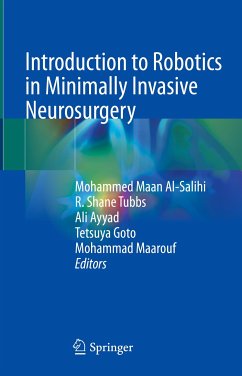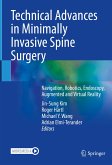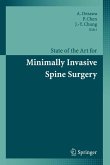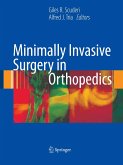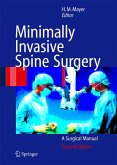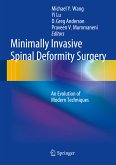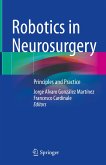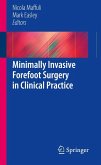Introduction to Robotics in Minimally Invasive Neurosurgery (eBook, PDF)
Redaktion: Al-Salihi, Mohammed Maan; Maarouf, Mohammad; Goto, Tetsuya; Ayyad, Ali; Tubbs, R. Shane
65,95 €
65,95 €
inkl. MwSt.
Sofort per Download lieferbar

33 °P sammeln
65,95 €
Als Download kaufen

65,95 €
inkl. MwSt.
Sofort per Download lieferbar

33 °P sammeln
Jetzt verschenken
Alle Infos zum eBook verschenken
65,95 €
inkl. MwSt.
Sofort per Download lieferbar
Alle Infos zum eBook verschenken

33 °P sammeln
Introduction to Robotics in Minimally Invasive Neurosurgery (eBook, PDF)
Redaktion: Al-Salihi, Mohammed Maan; Maarouf, Mohammad; Goto, Tetsuya; Ayyad, Ali; Tubbs, R. Shane
- Format: PDF
- Merkliste
- Auf die Merkliste
- Bewerten Bewerten
- Teilen
- Produkt teilen
- Produkterinnerung
- Produkterinnerung

Bitte loggen Sie sich zunächst in Ihr Kundenkonto ein oder registrieren Sie sich bei
bücher.de, um das eBook-Abo tolino select nutzen zu können.
Hier können Sie sich einloggen
Hier können Sie sich einloggen
Sie sind bereits eingeloggt. Klicken Sie auf 2. tolino select Abo, um fortzufahren.

Bitte loggen Sie sich zunächst in Ihr Kundenkonto ein oder registrieren Sie sich bei bücher.de, um das eBook-Abo tolino select nutzen zu können.
This book presents a basic introduction of the role of robotics in neurological surgery in a systematic organized manner. The work provides thorough explanations of the history, types, uses, application, current practice, and future directions of robotics in each division of the field of neurosurgery. The book is written in clear understandable language, making it suitable for medical students, interns, residents, specialists, consultants, and professors.
- Geräte: PC
- ohne Kopierschutz
- eBook Hilfe
- Größe: 6.28MB
Andere Kunden interessierten sich auch für
![Technical Advances in Minimally Invasive Spine Surgery (eBook, PDF) Technical Advances in Minimally Invasive Spine Surgery (eBook, PDF)]() Technical Advances in Minimally Invasive Spine Surgery (eBook, PDF)69,95 €
Technical Advances in Minimally Invasive Spine Surgery (eBook, PDF)69,95 €![State of the Art for Minimally Invasive Spine Surgery (eBook, PDF) State of the Art for Minimally Invasive Spine Surgery (eBook, PDF)]() State of the Art for Minimally Invasive Spine Surgery (eBook, PDF)113,95 €
State of the Art for Minimally Invasive Spine Surgery (eBook, PDF)113,95 €![Minimally Invasive Surgery in Orthopedics (eBook, PDF) Minimally Invasive Surgery in Orthopedics (eBook, PDF)]() Minimally Invasive Surgery in Orthopedics (eBook, PDF)314,95 €
Minimally Invasive Surgery in Orthopedics (eBook, PDF)314,95 €![Minimally Invasive Spine Surgery (eBook, PDF) Minimally Invasive Spine Surgery (eBook, PDF)]() Minimally Invasive Spine Surgery (eBook, PDF)161,95 €
Minimally Invasive Spine Surgery (eBook, PDF)161,95 €![Minimally Invasive Spinal Deformity Surgery (eBook, PDF) Minimally Invasive Spinal Deformity Surgery (eBook, PDF)]() Minimally Invasive Spinal Deformity Surgery (eBook, PDF)97,95 €
Minimally Invasive Spinal Deformity Surgery (eBook, PDF)97,95 €![Robotics in Neurosurgery (eBook, PDF) Robotics in Neurosurgery (eBook, PDF)]() Robotics in Neurosurgery (eBook, PDF)73,95 €
Robotics in Neurosurgery (eBook, PDF)73,95 €![Minimally Invasive Forefoot Surgery in Clinical Practice (eBook, PDF) Minimally Invasive Forefoot Surgery in Clinical Practice (eBook, PDF)]() Minimally Invasive Forefoot Surgery in Clinical Practice (eBook, PDF)73,95 €
Minimally Invasive Forefoot Surgery in Clinical Practice (eBook, PDF)73,95 €-
-
-
This book presents a basic introduction of the role of robotics in neurological surgery in a systematic organized manner. The work provides thorough explanations of the history, types, uses, application, current practice, and future directions of robotics in each division of the field of neurosurgery. The book is written in clear understandable language, making it suitable for medical students, interns, residents, specialists, consultants, and professors.
Dieser Download kann aus rechtlichen Gründen nur mit Rechnungsadresse in A, B, BG, CY, CZ, D, DK, EW, E, FIN, F, GR, HR, H, IRL, I, LT, L, LR, M, NL, PL, P, R, S, SLO, SK ausgeliefert werden.
Produktdetails
- Produktdetails
- Verlag: Springer Nature Switzerland
- Seitenzahl: 139
- Erscheinungstermin: 22. Februar 2022
- Englisch
- ISBN-13: 9783030908621
- Artikelnr.: 63495620
- Verlag: Springer Nature Switzerland
- Seitenzahl: 139
- Erscheinungstermin: 22. Februar 2022
- Englisch
- ISBN-13: 9783030908621
- Artikelnr.: 63495620
- Herstellerkennzeichnung Die Herstellerinformationen sind derzeit nicht verfügbar.
Mohammed Maan Al-Salihi is a Medical doctor from Iraq, published many papers in international peer-reviewed neurosurgical journals, editor of the book "Pineal Neurosurgery." Apart from these publications, Mohammed has devised many research courses for neurosurgical residents in Iraq at the Neurosurgery Teaching Hospital. Also, he has provided courses in neuroanatomy and neurophysiology for medical students at the College of Medicine/ University of Baghdad. Mohammed was the first Iraqi medical student to publish a neurosurgical paper and the first to edit a book published by a prestigious publishing company. He has authored the chapter "Evolutionary Retrace of the Third Eye" and explored the evolutionary background of the pineal gland, emphasizing the "why" rather than the "how", trying to understand how this organ first appeared and why it has attained its current status. Dr. R. Shane Tubbs is a clinical anatomist who practiced in pediatric neurosurgery at theChildren's Hospital in Birmingham for 25 years. His research interests are centered around what his lab has termed "reverse translational anatomy research", where clinical/surgical problems are identified and addressed via anatomical studies. This investigative paradigm has resulted in over 1,700 peer reviewed publications. Dr. Tubbs' lab has made novel discoveries in human anatomy and many anatomical feasibility studies from his lab have been used by surgeons around the world. He has been a visiting professor to major institutions in the U.S. and worldwide. He has authored/edited over 50 books including Gray's Anatomy Review, Gray's Clinical Photographic Dissector of the Human Body, Netter's Introduction to Clinical Procedures, Anatomy for Plastic Surgery of the Face, Head, and Neck, Nerves and Nerve Injuries, A History of Human Anatomy, and Bergman's Comprehensive Encyclopedia of Human Anatomic Variation. He is an editor for the 41st and 42nd editions of Gray's Anatomy and the 5th through 8th editions of Netter's Atlas of Human Anatomy, and is editor-in-chief of Clinical Anatomy, the official journal of the American and British Associations of Clinical Anatomists. Dr. Tubbs is chair of the Federative International Programme on Anatomical Terminologies. Dr Ali Ayyad is a Senior consultant neurosurgeon currently working in Hamad General Hospital Doha, Qatar. He is also an Associate Professor of Neurosurgery at Saarland University, Homburg-Germany. His interests encompass skull base, cerebrovascular, minimal invasive neurosurgery and Neuro endoscopy. Dr Ayyad holds the portfolio of Director of Research at Department of Neurosurgery in Hamad General Hospital Doha. He has to his credit, a number of publications in leading neurosurgical journals and has also co-authored multiple book chapters. He has been invited as distinguished faculty to numerous regional and international conferences and his services as a neurosurgery instructor and tutor at aplethora of workshops including microneurosurgery and neuro endoscopy speak volumes of his keen interest as an educationist in neurosurgery. Prof. Goto is one of the world's leading neurosurgeons in the field of robotics. He has published more than a 100 research. He and his colleague have developed many robotics surgery systems in Neurosurgery; NeuRobot (1996-2006): master-slave manipulator in endoscopic neurosurgery, iArmS® (2008-2016): robotics controlled freely movable armrest, SCOT® (2016-Present): IoT operating room for neurosurgery. Prof. Goto trains neurosurgical residents and medical students as a part of his job at St. Marianna University. Prof. Marrouf has authored more than 120 research papers, all published in the best leading neurosurgical journals. He has also made many conferences presentations. Prof. Marrouf has written many chapters contributing to major textbooks in neurosurgery. He trains neurosurgical residents and medical students at the University of Cologne, as part of his job as professor of stereotaxis and functional neurosurgery. Prof. Marrouf is one of the world's leading authors in the field of robotics in neurosurgery and he has many publications in this regard.
Introduction and history of robotics in neurosurgery.- Robotics in cerebrovascular and endovascular neurosurgery.- Robotics in stereotactic neurosurgery.- Robotics in neuro-endoscopy.- Robotics in spinal neurosurgery.- Nanorobots in neurosurgery.- IoT and AI in the neurosurgical operating theater.- Surgeon supporting robot.- Virtual reality and simulation in neurosurgical training with robots.- Future directions for robotics in neurosurgery.
Introduction and history of robotics in neurosurgery.- Robotics in cerebrovascular and endovascular neurosurgery.- Robotics in stereotactic neurosurgery.- Robotics in neuro-endoscopy.- Robotics in spinal neurosurgery.- Nanorobots in neurosurgery.- IoT and AI in the neurosurgical operating theater.- Surgeon supporting robot.- Virtual reality and simulation in neurosurgical training with robots.- Future directions for robotics in neurosurgery.
